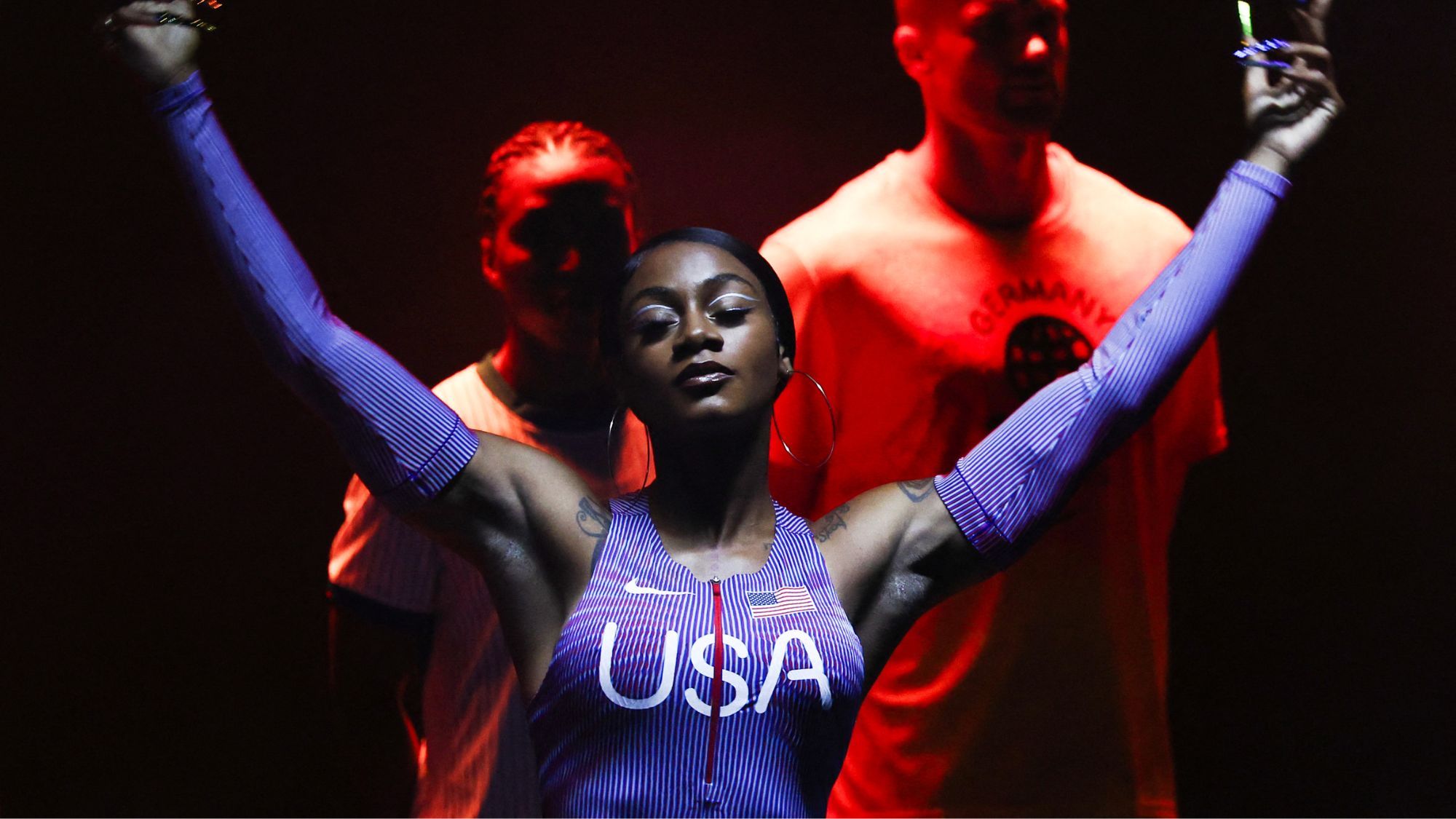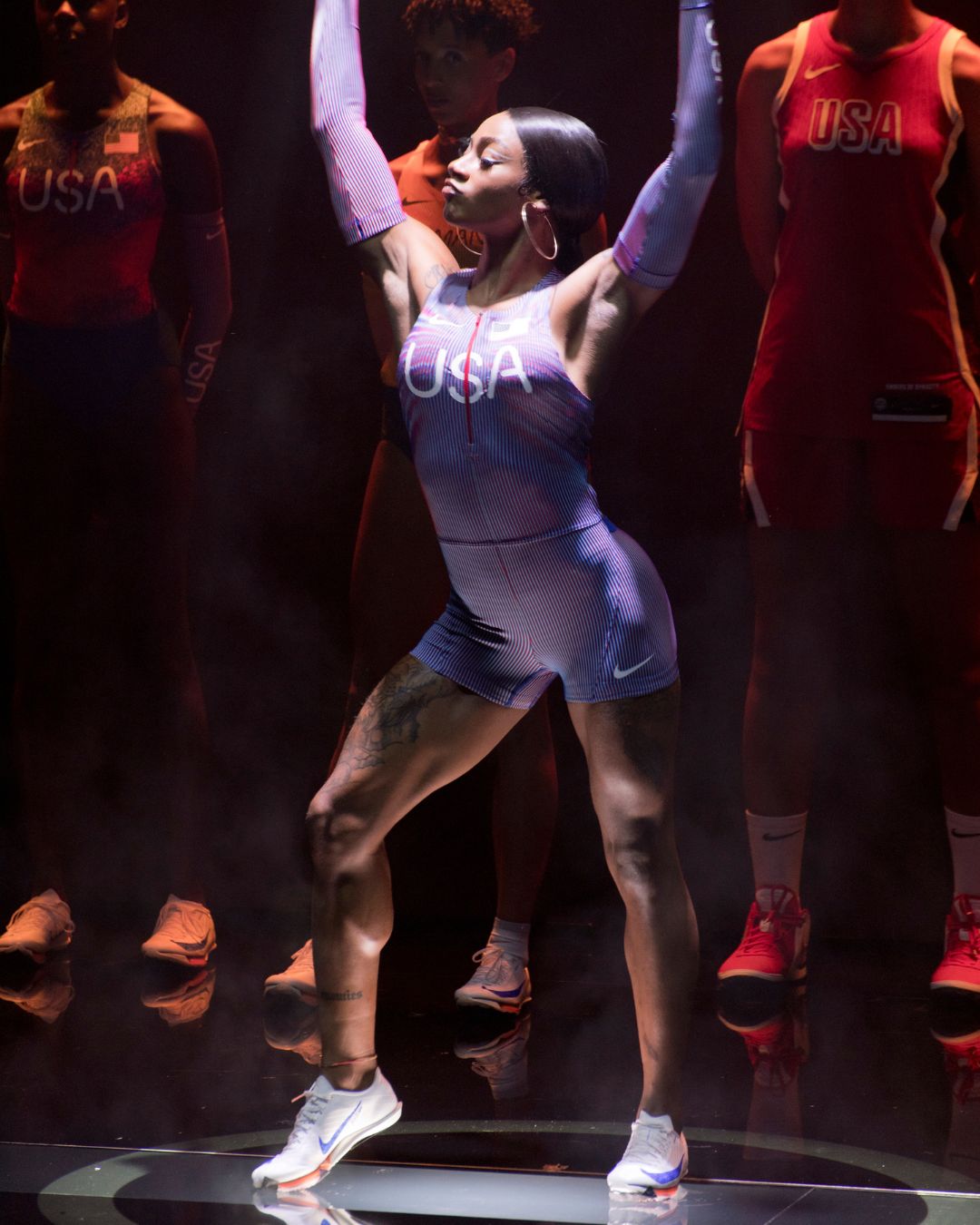As a seasoned runner, I can’t even begin to tell you everything that’s wrong with the Nike US Olympic kit
Once again, women are being set up for failure in sport. Here’s where it all went wrong

This week, sportswear giant Nike released their official Olympic kit for Team USA. Anyone else eagerly awaiting July for the chance to see top-of-their-game athletes perform on the world stage? Because, same. Yet sadly, my heart dropped when I saw the kit.
Among Nike's designs are their respective track and field kits - the men's, a racing vest and knee-length cycling shorts. And the women's? A high-cut unitard which has left thousands across the globe questioning who designed it.
Athletes, editors, and more have taken to social media to criticise the women's design, with many established track and field pros personally chipping in to share their disdain.
Steeplechaser Colleen Quigley was one of the first to comment, leaving a crying emoji with the reply: “I mean I still wanna make the team but ….”. Marathon runner Philly Bowden and long jumper Tara Davis-Woodhall also left comments questioning the seemingly unnecessarily revealing design.
One user commented: "Hi @europeanwax would you like to sponsor Team USA for the upcoming Olympic Games!? Please and thanks," with another questioning whether Nike had run out of fabric after designing the men’s kit. A further user added: "If the labia are hanging out on a still mannequin, what do we expect to happen to a moving person?".
Others were quick to question whether any of the design team consulted a woman about the race kit, with one adding: "Tell me it was male designers without telling me it was male designers." This is something Nike has been quick to rebuke, sharing with CBS Sports that they'd “used advanced body scanning and motion capturing” during the design process and also took onboard feedback from athletes.
A post shared by CITIUS MAG | Running + Track and Field News (@citiusmag)
A photo posted by on
Double standards and barriers to performance
I actually spat out my coffee when the kit first popped up on my Instagram feed. I thought it might have been a joke or just a part of the kit with shorts to follow. But no - once again, women are expected to compete in kit that arguably puts them at a disadvantage to their male counterparts. How are they meant to be able to focus on doing what they do best and what they are paid to do in what's arguably a revealing one-piece?
Celebrity news, beauty, fashion advice, and fascinating features, delivered straight to your inbox!
While images of track and field athlete Sha'Carri Richardson at the launch of the kit this week show her in a vest and shorts, rather than the one-piece that's been doing the rounds on social media, even that "longer" option for female athletes is significantly shorter than the men's design.
It's sadly a tale as old as time. I wrote an article back in 2021 on the same topic when the Norway women's beach handball team were fined £1,300 for not competing in the regulation bikini bottoms (they opted for shorts, instead). Three whole years ago, I asked why female Olympians are required to wear less clothing than their male counterparts. And yet it's still happening.
It wasn't the first incident to shine a light on sexist and archaic kit rules that put female athletes at a disadvantage during the Tokyo Summer Olympic Games either, with other female athletes being scrutinised for their kit over the course of the tournament.
It draws attention to the dated and often unofficial Olympic dress code traditions which put women on the back foot. You see, while official committees dictate the necessary kit for each discipline, vague and unclear "rules" often leave them being required to wear less.
These rules also do the games a disservice, as I know personally from a call with the Olympic Committee how hard they've been working behind the scenes to make sure the Paris games are more balanced. This summer's Olympics will be the first-ever gender-equal games - a huge step from the games 100 years ago where 5% of athletes were female - and female athletes will be prioritised in prime-time TV slots to make sure fans at home are able to support them.
This, coupled with the undeniable change in attitude when it comes to supporting women in sports - not to mention funding the vital (and extremely necessary) research to ensure we can perform at our best - gave me immense hope that things might have moved forward in 2024. But not if this USA kit is anything to go by. There can't be a physiological advantage to it, or the men would be in unitards, too. So why, once again, are women's needs not considered? Why, again, are women made to compete in clothes that are barely there?
Don't understand why this is such a big deal? I ask you this. If you've raced a 5km before or even given a big presentation at work, you know how it can feel to prepare for something for months on end. You'll also know that you want to feel comfortable, supported, and your best during said performance, not worrying about what you're wearing being too revealing or actually hindering you.

Track and field athlete Sha'Carri Richardson showcasing the new Nike kit this week.
Making sport more inclusive
The impact is sadly more far-reaching than you'd think. Study after study highlights barriers to entry for young girls looking to get into sport, and feeling self-conscious is one of the biggest hurdles. A study published by Victoria University even concluded that 88% of women would rather wear shorts for sport, and 90% would choose to wear a t-shirt over a more revealing option like a bra or tank top.
The bottom line is simple - sport needs to be more inclusive, and women need to be supported in the same way as men. Archaic kit rules need to be reassessed, and athletes need to be able to focus on their performance, rather than any other factors that might impact their game. If men aren't sexualised, women shouldn't be either.

Ally is Marie Claire UK's Senior Health and Sustainability Editor, a well-regarded wellness expert, nine-time marathoner, and Boston Qualifying runner.
Utilising her impressive skillset and exceptional quality of writing, she pens investigative, review and first-person pieces that consistently demonstrate flair and originality.
As well as writing, Ally manages a team of freelancers, oversees all commissioning and strategy for her pillars, and spearheads the brand's annual Women in Sport covers, interviewing and shooting the likes of Mary Earps, Millie Bright, and Ilona Maher. Shortlisted for three BSMEs and winning one in 2022, Ally lives and breathes her verticals: her eye for a story and connections within the wellness sphere are unrivalled. Follow Ally on Instagram for more.
